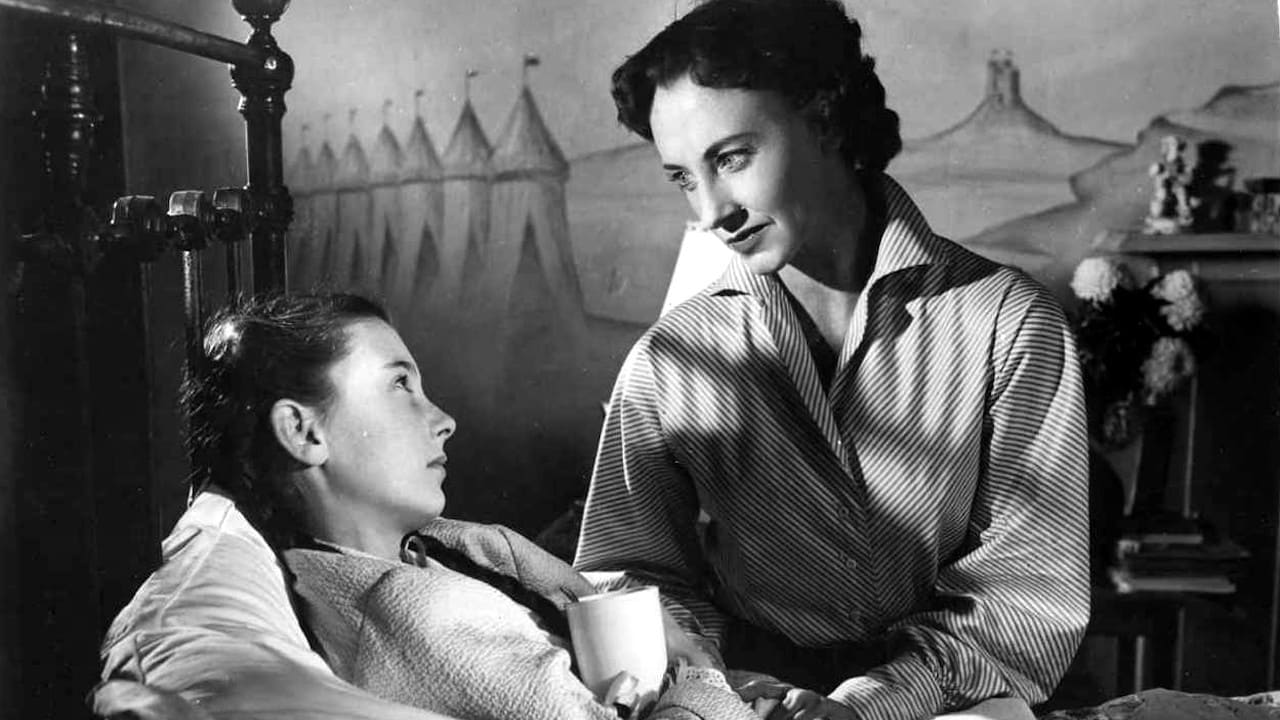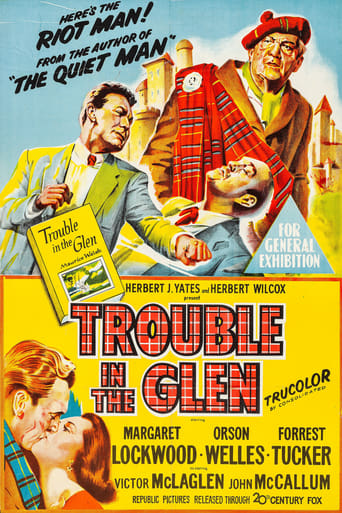



What makes it different from others?
Tied for the best movie I have ever seen
Best movie ever!
The acting in this movie is really good.
When American visitor Forrest Tucker comes to Scotland with a mysterious agenda, he finds himself taking on more than he can chew in dealing with powerful Orson Welles and his feisty daughter (Margaret Lockwood) with whom he starts off on the wrong kilt. Welles is the owner of a road which he refuses to open to the locales, and Tucker is desperate to get him to open it. Lockwood refuses to allow Tucker to see her father, and soon it's a battle of wills between each of them. After Lockwood publicly humiliated Tucker, he sets off on delicious payback, and this opens the way up for them to begin communicating. It's sort of a Scottish "Taming of the Shrew" where the shrew won't bend, that is until he allows her in on a little secret that changes everything. The plot turns deadly as the Scottish locales (lead by Victor MacLaglen) band together to take desperate measures to get the road open.For much of the film, the atmosphere is light and comic, so the sudden twists towards the end are jarring. This was produced and directed by British film veteran Herbert Wilcox, so I'm wondering if he first had wife Anna Nesgle in mind for Lockwood's part. She's tough, crafty and no-nonsense, but don't expect the vixens of her Gainsborough type villains here. Tucker is a rugged but easy going hero, and Welles is a big pussycat underneath his character's gruff exterior. Some pretty Scottish scenery adds to the flavor, although a little bit of bag pipe music goes a long way. Oh, and by the way, my tagline at the top of this review is Welles' line, not Tucker's.
View MoreTo understand why Trouble In the Glen was brought to the screen at all is to remember this is also the studio that produced The Quiet Man which was taken from another Maurice Walsh story. John Ford wanted to do the film for years and went with Republic Pictures because he didn't have to pay for John Wayne's services. Still the penny pinching founder and head of Republic, Herbert J. Yates drove Ford crazy with his budget cutting here and there. It was a miracle the film was made at all and on location. So when The Quiet Man becomes a big artistic and commercial triumph, now Yates must be thinking himself a genius so why not assemble the same team, but without that troublesome John Ford. Go to Herbert Wilcox to produce and direct and we can even get Orson Welles who'll do just about anything to finance his projects. Since we'd now have to pay John Wayne a big salary since he's no longer under contract to Columbia, we'll get a second line actor like Forrest Tucker for his role.I can see all the wheels turning in Mr. Yates's mind as he probably plunged enthusiastically into Trouble in the Glen which can be described as a Scottish version of The Quiet Man. The problem is that it really did need the touch of John Ford to make it a great film.As it is it's not a bad film, Orson Welles and Victor McLaglen are at their scene stealing best. Forrest Tucker and Margaret Lockwood who is Welles's daughter are an attractive pair of romantic leads. The film is about an heir to a Scottish estate returning from South America and taking over the family place, but then getting into a quarrel with the locals and cutting them off from the use of a road running through his property. Forrest Tucker is like John Wayne, the stranger from America who has ties to the place also that we don't really learn about until almost the end of the film. Trouble in the Glen has the same kind of beautiful location cinematography that The Quiet Man has. But it really needed someone like John Ford at the helm.
View MoreU.S. Air Corps Major Lance Lansing (Forrest Tucker) returns to Scotland after WWII to a small glen, where he makes his home due to the laird, Sanin Mengues (Orson Welles), a wealthy South American who's returned to his ancestors' land with his daughter, Marilla (Margaret Lockwood).Everyone in the glen tries to persuade Mengues to bring piece to their homes, only to have Lansing and Parlan (Victor McLaglen), the Mengues foreman, get in a fight together.This was listed in my UK TV schedule as a good film and they have it a three-star rating. They made it sound like it was a film about Orson Welles visiting Scotland after the war, which is far from the actual plot.Welles really chews up the scenery - in a bad way. He's funny but also quite annoying and seems out of place. Lockwood is given little to do but be pretty. Tucker is so-so.I was disappointed because I was expecting something entertaining and "classy," whereas instead I got a boring, dull and sappy "nice" movie without any real positive traits.It's not terrible, it's just not very good.
View MoreI saw this film in the mid fifties while in the Navy and was struck by Welles's performance along with Tucker and McLaglen. A subtle comment on social divisions, showing the Gypsy "Tinks" or itinerant tinkers of Scotland who form a class of social pariahs. The storyline is a bit thin but the two great blusterers, Tucker and McLaglen make it worth the price of admission...although I believe I saw this film on the hangerdeck of the USS Bonhomme Richard CVA-31 in 1955 for free...
View More